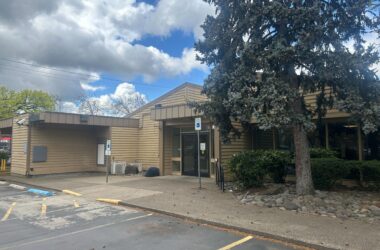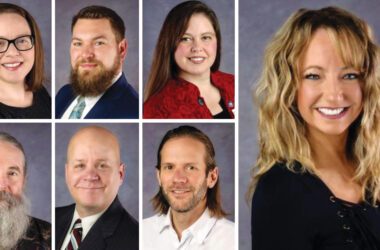Candidate Overview: Incumbents Tammy Hodgkinson (Position 1) and Joe Tucker (Position 6) did not respond to requests for participation. Both candidates are running unopposed. Dustin Bengtson, Duane Taddei and Martha Allen are running for Position 3, and Tina Murphy is running against incumbent Gary Mort for Position 7.
As a board member, where would you look to make budget cuts or expansions within the annual budget and why?
POSITION 3
MARTHA ALLEN: As a new board member, I would need to be educated on the budget. I would look closely at the amount of money that goes toward quality materials for children and teachers. If there is not enough money for the quality that is necessary to create a great education, I would lobby for more money. As a taxpayer, I would encourage more money from our taxes to go to making sure that the children get a first-rate education and teachers get paid for their hard work.
DUSTIN BENGTSON, incumbent: We will have to work hard to sustain existing levels of service supporting our community. Our discretion in shifting funds from one priority to another is constrained. Most of our funding is tied to labor or special program/grant funds targeted to improve specific educational outcomes. The good news is that the targeted funds line up with our highest priority needs: early childhood education, social/emotional support, and career technical education. We need to carve out funds to invest in our facilities. My hope is that we can help our community see the need for improving infrastructure.
DUANE TADDE: I would like to see the budget for school board meeting expenses be expanded to increase accessibility to the in-person meetings, to allow meeting room size to be expanded to allow all participants to be in the same room at the same time. I would also support technology improvements to make the online meetings more user-friendly to the average user. I would also look to increase the amount in the budget that is used to retain quality educators and support staff, realizing that employee turnover costs money, time and negatively affects students’ education.
POSITION 7
GARY MORT, incumbent: We have re-entered what seems likely to be an extended period of decreasing budgets and increasing needs. We’re working to find and use approaches that let kids “level up” in terms of being full participants – rewarding not just them, but also us – in terms of helping to ensure our efforts are not duplicated, fragmented, or spread too thin. We will continue to engage the kids and the community to understand their actual needs, instead of providing things that will cost resources but only might work, so we can use our resources effectively to best serve them, with their input.
TINA MURPHY: I would have to see the whole budget and also budgets for past years. I would like to talk to the teachers, administration, and parents to get their input.
While the graduation rate at Cottage Grove High was at 94%, Al Kennedy Alternative High School’s graduation rate was alarmingly low at 24% — with 40 the 63 students having dropped out in 2022. What can the District and its board do to better prepare students at Al Kennedy for graduation?
POSITION 3
ALLEN: I feel that Covid played a big part in the low graduation rate but also we need to look closely at what the children need. We need to interview the kids and ask them what they need. Are we making sure that they are getting both breakfast and lunch? Are we offering emotional support? When a child is struggling with reading or math or any class, are we offering one-on-one support? Each child is different and we need to be flexible to meet the needs of the individual. We also need to look at what we are teaching. Are we teaching children classes that can help them move forward toward a career without college? Are we teaching basic skills in money management? We need to be flexible to meet the needs of the individual.
BENGTSON: Students come to AKHS for a variety of reasons all with different stories, backgrounds and needs. For many reasons, our current systems weren’t a fit for them and they require a different kind of support to succeed. Re-engaging students, providing access to resources for a variety of basic needs, and working to generate a spark that makes education a priority is happening at AKHS. Positive role models using experiential learning helps kids see opportunities and pathways to the future. Keeping them connected is our challenge and there are tremendous success stories at AKHS.
TADDEI: For starters, we can make this information more accessible to the public regardless of how bad it may appear. This information from the Oregon Department of Education is key to spark conversation between all stakeholders and board members that I believe is not occurring. We have access to data that shows what we are capable of, why are we not using it to its fullest extent possible? Can we implement some practices from other district schools? What is holding these students back? What are the demographics? What are the hurdles? We don’t know, because we aren’t talking about it.
POSITION 7
MORT: Graduation rate is one – but only one – among many important indicators of how our kids are doing. I don’t think making significant changes in how we do things based on the years profoundly influenced by the pandemic is a good idea. Better questions might be: How are we improving the future lives of the kids at Al Kennedy? What failures exist in our traditional system that requires Al Kennedy to exist? What can the kids and staff at both high schools learn from each other that allows all of them to improve and provide useful experiences for all kids?
MURPHY: With only last year’s numbers, I can’t give much input. Only two of my four kids graduated when they were “supposed to” and one of them wanted to drop out, but at his parents’ insistence, he stayed the course. In other words, there are different ways for parents, students and teachers to go about getting to the graduation finish line.
What can the board and its district do to better prepare students for higher education or careers post-graduation?
POSITION 3
ALLEN: We need to create policies that allow teachers to meet the needs of the individual. If a child is bright and moving toward college, we should be offering classes to prepare that child for college. If a child is bright and moving toward learning a career without college, then we need to offer classes to prepare that child to move in that direction, like hands-on classes. All children should graduate knowing how the government works, how to manage money and how to think critically. If we provide evidenced-based classes, then we are ensuring children can grow into a productive person.
BENGTSON: I hope readers take the time to learn about the range of college ready and career technical education in South Lane. We have amazing opportunities and educators. The board needs to maintain the focus on academic rigor, professional development for staff, social/emotional support for students and collaboration with parents. I see the benefits of those investments being realized by our kids every day. We have skilled counselors guiding kids toward career and college pathways. The resources are available but not all families know how to access that support. We need better engagement with our families.
TADDEI: We can track students after graduation to see what works and what does not. We can do better at providing vocational education while students are attending high school and promoting career technical education as a viable alternative to graduating and attending college. Currently, the Oregon Department of Education grades school districts on how many students enroll in college within 16 months of graduation and completely ignores other options and those statistics. This gives the impression that we as stakeholders in education are not proud of a student’s choice to skip college and get right into the workforce.
POSITION 7
MORT: Encourage the development of curiosity and humility. Help students develop a passion for learning and incorporate that knowledge into their lives. Our world is unpredictable – and becoming even more so. To imagine that metrics from age six might reliably predict what kids need for long-term success is a fool’s errand. But it’s not foolish to imagine that being able to cooperate and get along with other people will be useful. Nor is it a stretch to imagine that being able to learn new things and be adaptive – as people, and relative to their skill set – will be useful (and important).
MURPHY: Give them a knowledge-based education.
If any, what policies should be adjusted or implemented to increase safety and inclusivity at SLSD?
POSITION 3
ALLEN: We should have policies that do not allow guns on campus. Unfortunately, we have had too many shootings at schools and a lot of the people that did these shootings needed help with emotional support. We need counseling for children and education to parents on what to look for in a child who is depressed. We need a way to help children feel free to talk about abuse at home and get help for these families. There should be a counselor in every school.
BENGTSON: I don’t know that change in policy will significantly increase safety and inclusivity in our schools. We have policies in place and processes to correct behaviors that help kids recover when they make mistakes. That is how kids learn. We need to meet kids where they are and support professional educators and counselors helping them find resources and overcome barriers. The way we conduct ourselves as adults is magnified in our schools. Students and staff cannot do their best work in an environment of constant conflict. Our recent community dialogue is working against that feeling of safety, care and belonging
TADDEI: I have an issue with very low test scores at Bohemia School. After posting data online, I was made aware that the majority of English learners are sent to Bohemia and that this may affect those scores. I would like to see increased options for these students and their parents so these students receive the education they deserve. We have no excuse to send an entire demographic to one corner of the school district, especially when they are testing below state standards. I also support increasing the utilization of school resource officers. They are the eyes and ears of safety.
POSITION 7
MORT: SLSD is actively engaged in both arenas. We’ve improved physical security at all school sites. We provide training in response to changing needs and perceptions of need. We work to reach out and listen to a diversity of students, staff, and community members to learn how to support them. There remains much work to be done – especially around inclusivity – and safety issues related to that. In this context (like many), our work is never done; it’s a dynamic process. As needs change, and problems or situations emerge, we reevaluate and adapt to provide a safe and inclusive environment for all.
MURPHY: Given today’s climate, I believe all schools should have a resource officer – someone armed and ready to protect and defend. On another note, all students should know that there will be consequences for misbehavior. These would be known to teachers, parents, and administrators.
What three issues do you believe are most pressing to the District and how do you plan to address them?
POSITION 3
ALLEN: I recognize that today’s schools and students face new or increased challenges, such as the threat of school shootings, bullying (both physical and online), post-Covid differences in academic achievement levels, and increased awareness and activism around social issues such as racism, book banning, vaccine hesitancy, LGBTQ awareness, and the role of religion in public education. While I don’t have easy answers to any of these issues (and would be suspicious of anyone who claims to) I do believe that these can be constructively addressed by school board members, administration and faculty working together in good faith with the common goal of best meeting the needs of students. Our children should not become hostages in the culture wars.
BENGTSON: Recruitment and staff development: Every school in Oregon is struggling with the same issue. Recruit talented people, on-board effectively, provide professional development, and advocate for additional resources to give them tools. Infrastructure: Support our maintenance team on near term priorities, get active in fundraising and position ourselves for capital investments in the next 5-10 years. Parent engagement: Attendance, behavioral issues and turning in work are the three most important influences for on time graduation. As parents we have tremendous opportunity to influence in these areas. We need to partner with our educators, not compete with them.
TADDEI: We must address the expected budget shortfall, hiring struggles, and decreasing enrollment. School districts are facing budget shortfalls across America. There are currently more than 30 job openings at SLSD right now and enrollment has decreased by about 300 students this year alone. Everyone knows that these issues I mentioned affect the budget negatively. Class sizes increase when positions cannot be filled long term. Rising food and fuel costs are a huge part of this. Hiring unqualified or inexperienced personnel and adding to their already full workload creates problems like payroll issues that we saw this year.
POSITION 7
MORT: Money, churn, and social divisiveness. We need better responses than “cut” (wages, services, or … ), and more effective bridge building with community partners. Turnover in district staff across all jobs is staggering. This isn’t just SLSD – it’s happening throughout society – approaching catastrophically in education. We must create a place where people want to come, and stay. If we cannot work towards seeing one another as humans who are deserving of humane treatment, then we’re heading to a universally harmful place – especially for our children. Again, not just SLSD. It’s the increasingly poisonous water we’re all swimming in.
MURPHY: Tina Murphy elected not to answer this question.







